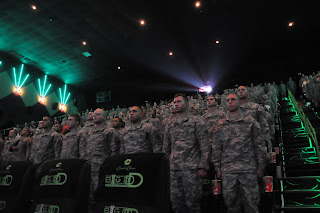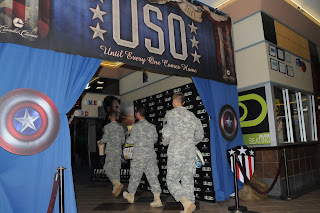Last week, I went to the “Captain America: The First Avenger” premier in Savannah with about 450 3rd Infantry Division Soldiers. I’m not doing a movie review, but I have to say I liked the film – a lot. I loved the action, I loved the 3D, I loved the actors chosen for the roles, and I enjoyed the story and what I saw as the heart of the film – that we shouldn’t jump to conclusions about people.
“Captain America: The First Avenger” is the story of Steven Rogers, a 90-pound asthmatic who is turned down from enlistment in the U.S. Army four times during World War II before being accepted into Operation: Rebirth, a project intended to enhance U.S. Soldiers to the height of physical perfection via “Super Soldier Serum.” Rogers was chosen, not for his physical attributes, but because he had a heart bigger than any of his counterparts. Once he is “reborn” a super-human, Rogers becomes known as “Captain America” and helps the U.S. fight off the Nazis.
Steven Rogers was a guy who people turned away without even giving him a chance, yet he possessed greatness that couldn’t be tested with a physical examination.
After the movie I talked to Sgt. Steven Melton, who is with the 3rd Combat Aviation Brigade here at Hunter Army Airfield. Sergeant Melton has been fan of Capt. America since he was a kid, and at 25 and standing about 5’3” he said he can really relate to Steven Rogers. He, like Rogers, doesn’t look like the prototypical Soldier, or what people “think of” as fitting the role or a Soldier, yet here he is.
Like in “Captain America,” the ideal physical specimens are revered in sports and the little guys are glanced over. Athletes like LeBron James, Terrell Owens or Zdeno Chara are what we expect – larger-than-life men who stand above us “normal” people.
But once in awhile a Steven Rogers comes around; a smaller guy who has the talent and the heart to figuratively stand nose-to-nose to those who physically tower above them; guys who were turned away again and again, told over and over that they couldn’t make it to the pros, and who had to work 10 times harder than those taller or more muscular than them to prove their worth.
When I was watching the NBA Finals, one player stood out to me and it wasn’t LeBron, Dwyane Wade, Chris Bosh or even Dirk Nowitzki – it was JJ Barea, the Dallas point guard.
Jose Juan Barea stands at 5’11” and weighs 175 pounds. In normal life that may be average or even slightly above average size; but in the basketball world it’s puny. Yet, as he went against LeBron, Wade, Bosh et al, he stood his own; against men 8, 10 or even 12 inches taller and probably 50 pounds of muscle heavier, Barea held his own.
Barea might be the Muggsy Bogues of the new generation. Bogues is the shortest player to ever to play in the NBA at 5’3” and 136 pounds. Yet, despite his diminutive size, Bogues was an NBA slam dunk champion. Both Barea and Bogues are significantly shorter than their NBA counterparts, yet both have significantly added to their teams, and have probably set a great example for all of the undersized kids who want to be more than what is expected.
But we all fall victim to making assumptions. When I saw Barea, I remembered a good player at Northeastern University in Boston while I attended Boston University; but I didn’t think it couldn’t be the same guy – Northeastern isn’t exactly an NBA feeding ground. Until one of the announcers said “Barea, who played college at Northeastern University in Boston…” and I realized I was guilty of jumping to a conclusion just like so many others; I assumed a guy from Northeastern couldn’t play in the NBA; others thinking a short guy can’t make it in the NBA.
Steven Rogers, Sgt. Steven Melton, JJ Barea and Muggsy Bogues – none of them “look the part.” People make assumptions when they see a shorter guy, and think he couldn’t possibly be a basketball player or a Soldier. But these men have proved through their heart and drive that they can stand with those who tower above them.





